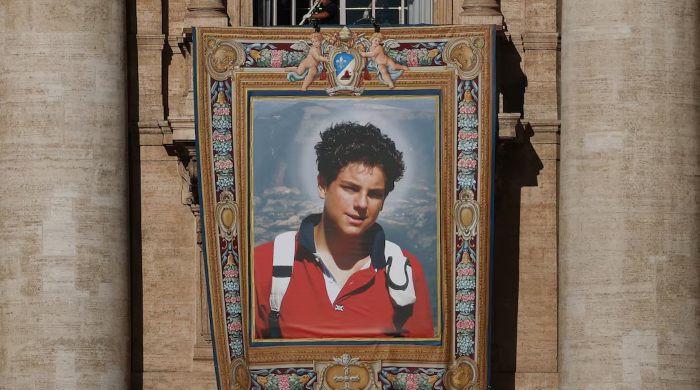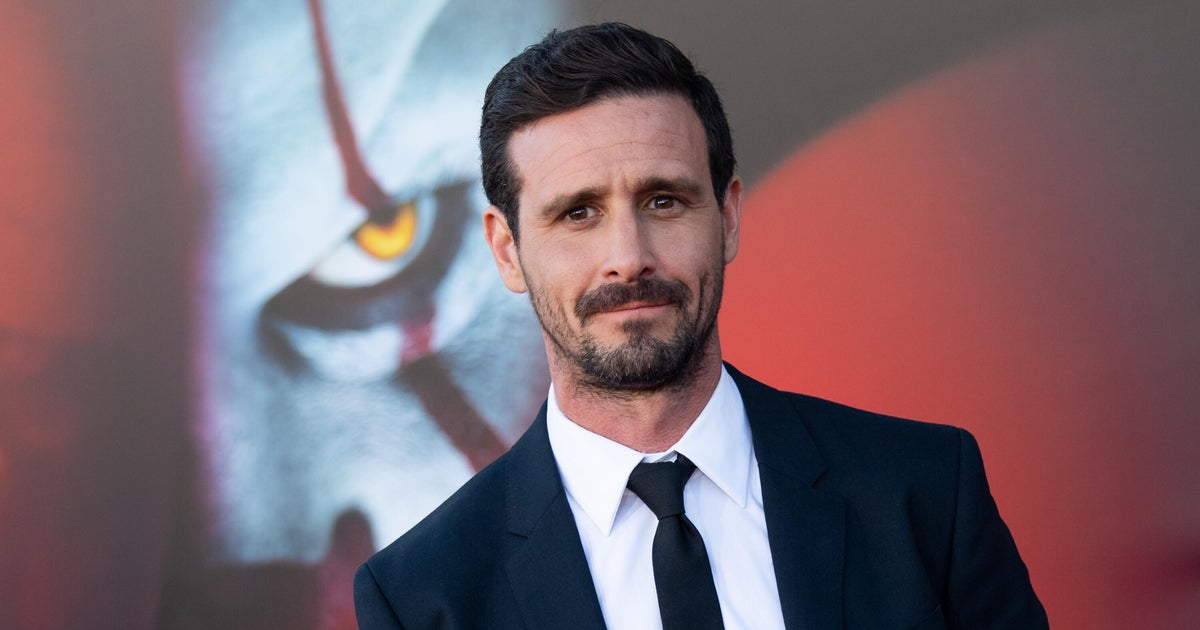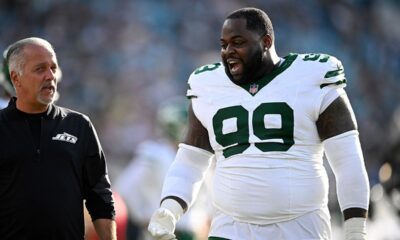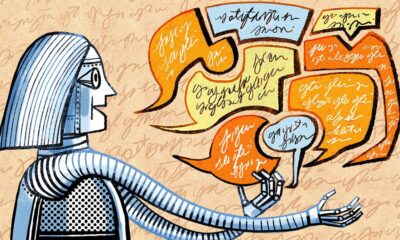Entertainment
Catholic teen set to become first millennial saint

Tens of thousands of pilgrims are expected at the Vatican Sunday for the canonisation of an Italian teenager dubbed “God’s Influencer” for his efforts to spread the Catholic faith online.
Carlo Acutis, who died of leukaemia in 2006 aged 15, will be made the first millennial saint by Pope Leo XIV in a solemn ceremony in St Peter’s Square.
The teenager’s body, dressed in jeans and a pair of Nike trainers, lies in a glass-walled tomb in Assisi, visited by hundreds of thousands of people a year.
The canonisation of the so-called “cyber-apostle” was initially set for April but postponed when Pope Francis died. It will be US-born Pope Leo’s first such ceremony.
Among the crowds expected at the Vatican for the mass, which begins at 10:00 am (0800 GMT), are over 800 people travelling to Rome on a special train from Assisi.
The mass will also be watched by faithful on giant screens in Assisi, a medieval city and pilgrimage site in the central region of Umbria.
“I know that many will come, many will follow on television — many came already for April 27. And I’m sure that Carlo thanks them,” said his mother, Antonia Salzano.
In a video published by the Assisi diocese on Saturday, she said her son was proof that “we are all called to be saints… everyone is special”.
A large tapestry featuring a photograph of the saint-to-be hung on the facade of St Peter’s Basilica ahead of the ceremony.
‘Exemplary life’
Acutis, born in London in 1991 to Italian parents, had an ardent faith, though his parents were not particularly devout.

He grew up in the northern city of Milan, where he attended mass daily and had a reputation for kindness to bullied children and homeless people, bringing the latter food and sleeping bags.
A fan of computer games, Acutis taught himself basic coding and used it to document miracles and other elements of the Catholic faith online.
Domenico Sorrentino, bishop of Assisi, called on young people on Friday to follow Acutis’s example.
“Today more than ever we need positive examples, exemplary life stories that can help our young people avoid following discouraging images, violent examples, and fleeting fads that leave nothing behind,” he said in a statement.
The Vatican has recognised Acutis as performing two miracles since his death — a necessary step on the path to sainthood.
The first was the healing of a Brazilian child suffering from a rare pancreatic malformation, the second the recovery of a Costa Rican student seriously injured in an accident.
In both cases, relatives had prayed for help from the teenager, who was beatified in 2020 by Pope Francis.
Entertainment
Amanda Seyfried is ‘going to keep campaigning’ for ‘Mamma Mia 3′

Amanda Seyfried is not letting go of her hopes for a third Mamma Mia! film and says she’s more motivated than ever to see it happen.
Speaking with PEOPLE at the Los Angeles premiere of The Testament of Ann Lee on Dec. 14, the actress made it clear she’s ready to keep pushing for Mamma Mia 3, especially if it allows her beloved character Sophie to step into a new phase of life.
When asked what Sophie’s future might look like if the franchise returns, Seyfried immediately imagined motherhood.
“Oh, with kids. I mean, I love being a mother,” the 40-year-old said, drawing a parallel between her own life and Sophie’s journey.
“I love playing a mother, and I would love to dive into the curiosities of motherhood and raising children on a Greek island, just like Donna did with Sophie.”
Meryl Streep famously played Donna, Sophie’s free-spirited mother, in the original 2008 musical.
Seyfried believes that exploring Sophie as a parent could open up fresh emotional ground for the story.
“I think that would be really interesting,” she said, adding that while she doesn’t know exactly where the plot would go, she’s confident the heart of the franchise would remain the same.
“I have no idea where the story is going to go, but I know there’s going to be a lot of singing and dancing.”
Her enthusiasm doesn’t stop there. Seyfried made it clear she’s not quietly waiting on the sidelines.
“I’m going to keep campaigning for that movie until I’m blue in the face,” she said, emphasizing just how committed she is to seeing the third installment made.
There is reason for optimism.
Producer Judy Craymer has confirmed that a script for Mamma Mia 3 has already been completed and that the film remains in development as a follow-up to 2018’s Mamma Mia! Here We Go Again.
“Well, we know what we want to do with the movie, and it will happen,” Craymer told Deadline in May, while also discussing the possibility of Sabrina Carpenter joining the cast alongside Seyfried and Streep.
Off screen, Seyfried brings real-life experience to the idea of motherhood.
She shares daughter Nina, 8, and son Thomas, 5, with her husband, actor Thomas Sadoski.
The couple got engaged in 2016, eloped the following year, and now live with their children on a farm in upstate New York.
For Seyfried, both on screen and off, motherhood seems like a story she’s more than ready to keep telling.
Entertainment
Actor James Ransone, known for his roles in “The Wire” and “It: Chapter Two,” dies at 46

James Ransone, the actor who played Ziggy Sobotka in the HBO series “The Wire” and appeared in many other TV shows and movies, has died. He was 46.
The Los Angeles County Medical Examiner’s office said in online records that Ransone died by suicide on Friday.
Ransone’s film credits include “It: Chapter Two,” “The Black Phone” and “Black Phone 2,” and he appeared in TV shows including the cop drama “Bosch” and “Poker Face.”
CBS News reached out to representatives of Ransone on Sunday, as well as to a spokesperson for the medical examiner’s office, for comment.
Emma McIntyre/FilmMagic
Ransone, a Maryland native, told Interview Magazine in 2016 that he had realized he was a full-blown actor while shooting “Generation Kill,” a 2008 HBO mini-series also starring Alexander Skarsgård and Jon Huertas. He also spoke about struggling with addiction for several years before he sobered up ahead of filming the series.
According to the interview, Ransone’s passion for performing arts was cultivated when he was a teenager in Baltimore.
“Baltimore breeds a really specific type of weirdo,” he told Interview Magazine. “Animal Collective is from Baltimore. Dan Deacon, John Waters. There’s a through line of weirdness and a hard edge that I see when I meet people from that area.”
Ransone is survived by his wife and their two children.
If you or someone you know is in emotional distress or a suicidal crisis, you can reach the 988 Suicide & Crisis Lifeline by calling or texting 988. You can also chat with the 988 Suicide & Crisis Lifeline here.
For more information about mental health care resources and support, The National Alliance on Mental Illness (NAMI) HelpLine can be reached Monday through Friday, 10 a.m.–10 p.m. ET, at 1-800-950-NAMI (6264).
Entertainment
Vogue Williams says ‘end of era’ as couple sell Battersea flat

Irish media personality and model, Vogue Williams and her husband Spencer Matthews have taken a major step in their personal lives by selling their £4.25million Battersea apartment and buying their ‘forever’ home in London.
The couple first put their luxurious London flat on the market two years ago, slashing the price but a staggering £1million during that time.
In the latest episode of her YouTube vlog, Vogue shared the couple have finally sold the first home where they made memories together and purchased their ‘forever’ family house in London back in June.
The I’m A Celeb star gave fans a sneak peak of the stunning new property but admitted the family will have to wait at least 18 months in due to extensive renovations.
‘We sold our apartment. It’s gone. End of an era. The apartment is gone,’ Vogue told viewers.
‘We’ve got a rental around the corner so that the kids can stay in school because we have bought our dream house.’
‘I’ll miss this apartment. We’ve lived here for seven years. It’s the first place we lived together. All our kids were born here. So, it’s going to be weird saying goodbye, but at the end of the day, we have this amazing house that we’re going to love so much.’
‘This is our forever house. I know that people say that, but it actually is our forever house. It’s like my dream home I have in Ireland. And this is the dream home here where I think the kids will grow up.’
Back in April it was revealed that Vogue and Spencer had knocked a further £450,000 off the asking price of their luxurious London apartment.
-

 Business1 week ago
Business1 week agoHitting The ‘High Notes’ In Ties: Nepal Set To Lift Ban On Indian Bills Above ₹100
-

 Business7 days ago
Business7 days agoStudying Abroad Is Costly, But Not Impossible: Experts On Smarter Financial Planning
-

 Business7 days ago
Business7 days agoKSE-100 index gains 876 points amid cut in policy rate | The Express Tribune
-

 Sports7 days ago
Sports7 days agoJets defensive lineman rips NFL officials after ejection vs Jaguars
-

 Tech1 week ago
Tech1 week agoFor the First Time, AI Analyzes Language as Well as a Human Expert
-

 Entertainment7 days ago
Entertainment7 days agoPrince Harry, Meghan Markle’s 2025 Christmas card: A shift in strategy
-

 Business4 days ago
Business4 days agoBP names new boss as current CEO leaves after less than two years
-

 Fashion4 days ago
Fashion4 days agoIndonesia’s thrift surge fuels waste and textile industry woes






